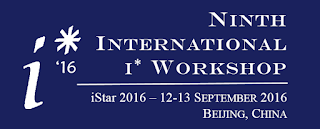The workshop will be co-located to the 29th International Conference on Advanced Information Systems Engineering (CAiSE'17).
Sunday, December 4, 2016
iStar 2017 workshop at CAiSE
This year I'm organising the International Workshop of i* jointly to Lin Liu and Sepideh Ghanavati. You can find the workshop details at iStar17 website.
Tuesday, November 1, 2016
Q-Rapids European Research Project starts
Q-Rapids: Quality-aware rapid software development
H2020 (H2020-ICT-2016-1, Software Technologies)
The 3-year Q-Rapids defines an empirical-based, data-driven quality-aware rapid software development methodology.
Quality Requirements (QRs) are incrementally elicited and refined based on data gathered both during development and at runtime. This data is elaborated into quality-related key indicators presented to decision makers through a strategic dashboard with advanced capabilities. Selected QRs are integrated with functional requirements for their unified treatment in the rapid software development process.
More information at www.q-rapids.eu
Wednesday, September 7, 2016
Today arrived a printed copy of my first book chapter
Surprisingly, yesterday arrived a printed copy of my first book chapter. I'm not sure who send it to me, so I don't know who to thank you.
The i* framework for goal-oriented modeling
Xavier Franch, Lidia Lopez, Carlos Cares and Daniel Colomer
Abstract. i* is a widespread framework in the software engineering field that supports goal-oriented modeling of socio-technical systems and organizations. At its heart lies a language offering concepts such as actor, dependency, goal and decomposition. i* models resemble a network of interconnected, autonomous, collaborative and dependable strategic actors. Around this language, several analysis techniques have emerged, e.g. goal satisfaction analysis and metrics computation. In this work, we present a consolidated version of the i* language based on the most adopted versions of the language. We define the main constructs of the language and we articulate them in the form of a metamodel. Then, we implement this version and a concrete technique, goal satisfaction analys is based on goal propagation, using ADOxx. Throughout the chapter, we used an example based on open source software adoption to illustrate the concepts and test the implementation.
ISBN: 978-3-319-39416-9 (Print) 978-3-319-39417-6 (Online)
The final publication is available at Springer via http://dx.doi.org/10.1007/978-3-319-39417-6
Sunday, July 24, 2016
Three papers accepted in the i* International Workshop (iStar 2016)
An Empirical Evaluation Roadmap for iStar 2.0
Lidia López, Fatma Başak Aydemir, Fabiano Dalpiaz and Jennifer Horkoff
Towards iStarML 2.0: Closing Gaps from Evolved Requirements
Carlos Cares and Lidia López
iStarJSON: A Lightweight Data-Format for i* Models
Oscar Franco-Bedoya, David Ameller, Dolors Costal and Lidia López
Tuesday, June 28, 2016
Paper accepted in the Information Systems Journal (my first Q1!!!!!!!!)
Subscribe to:
Posts (Atom)







